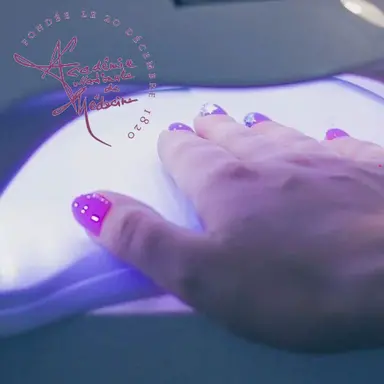
In the last 10 years, the nail salon sector has grown significantly. Institutes specialising in nail beauty and “nail bars” are developing and in 2010-2011, more than 87% of nail salons declared using an ultraviolet (UV) lamp to apply semi-permanent varnish. And this is what poses a problem, since the French Academy of Medicine is now warning about the side effects, and in particular the risks of skin cancer, linked to their use.
International nail market is growing by 9.5% in value and is expected to reach 13 billion euros by 2024. Nails account for 15% of the beauty market and it now affects all ages from 17 to 90 years.
Among the most important attractions of nail art, is semi-permanent nail polish, which has the advantage over traditional nail polish of lasting to 2 or 3 weeks. However, its application requires a lamp combining UV (at least 48 watts) and light-emitting diode (LED) to dry and fix each of the four layers of varnish applied. Unfortunately, these lamps emit UV type A rays (UVA), which penetrate deep into the skin and are known to promote aging, and especially the development of skin cancers.
Side effects now identified
In 2022, a summary of the side effects induced by semi-permanent varnishes identified three types, all in women: allergic skin reactions (66 cases, 70.5%), nail mechanical damage (23 cases, 26.1%) and three cases of UV- induced skin squamous cell carcinoma (3.4%).
UVA rays are known to damage skin cells DNA by producing oxygen free radicals, which induce mutations at the origin of cancers in these cells. The particularity of UVA is to always induce the …













